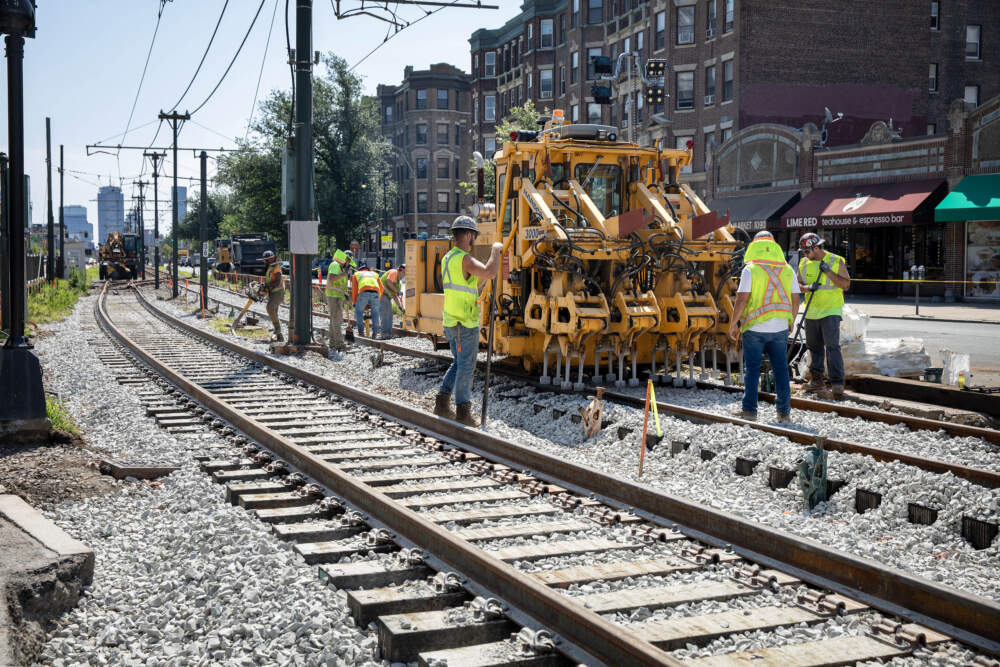Advertisement
What the new state budget means for the future of transit
Resume
The $56 billion state budget Gov. Maura Healey signed on Wednesday drew mixed reactions from transportation experts and advocates who had hoped for more ambitious investment in public transit.
They praised key features, such as the boost to regional transit authorities, like the MBTA, that received twice as much funding in this fiscal year's budget compared to last year's, thanks to revenue expected from the so-called "millionaire's tax."
Of the $477 million from the new wealth tax that has been allocated to transportation, the MBTA is expected to receive $180.8 million for capital improvement. But transit leaders say the money isn't nearly enough to address the mounting needs at the MBTA.
Jarred Johnson, executive director of the nonprofit TransitMatters, said the T needs between $9 and $15 billion to address a backlog of "state of good repair" fixes, and tens of billions of dollars to begin modernizing the system, such as electrifying the commuter rail and bus networks.
"This is a great little head start, but we've got to talk seriously about real long term finance reform," he said of the state budget. "This is a drop in the bucket compared to what the T is going to need over the next 10 to 15 years."
The MBTA will also receive $10.8 million for the Red-Blue line connector program, and $5 million for the design of a low-fare income program.
"Eventually all of this stuff is going to come due and it's going to be extremely expensive so the sooner that lawmakers act on this and actually decide to invest money in, the cheaper it'll be for taxpayers," said Boston Globe opinion writer Abdallah Fayyad. "If they want to keep up with the growing population, housing, transportation needs, they have to put the money aside, and one day or the next they're going to have to do it."
One major item that advocates hoped would see funding in the state budget but didn't is the East-West rail project connecting Boston and Pittsfield. The Legislature left out $12 million Gov. Maura Healey requested to revive the proposal, according to Johnson, though some funding has been secured elsewhere.
Johnson and Fayyad joined WBUR's Radio Boston to talk about the future of transit in the Massachusetts in light of the newly signed budget.
Below are highlights from their conversation, which have been lightly edited for clarity.
Interview Highlights
On what more the Healey administration can do
Fayyad: "The reality is that we still are one of states that has one of the highest tax revenues per capita in the wealthiest country in the world, and for some reason we don't have a vision to paint a picture of a well-functioning, environmentally friendly, frequent, fast, high-speed rail in this state. That's a huge disappointment, especially when it's coming from an administration that says that it's focused on density and housing, on environmental justice and on alleviating the effects of climate change.
"If you really want to do that ... you're going to have to have a vision, even if it's 50 years from now, that you can make it a reality ... one day."
On the need for more transparent communication about the T's progress
Johnson: "I think this administration needs to be better about communicating. It needs to figure out what can you do tomorrow. I get that there are big problems, and some of these things are going to take some time to fix. ... For everyday riders, they need to do a better job of linking when are people's trains going to get faster, when are people going to have shorter wait times. That's the information that's missing, even if ... that information is 'hey, there are some challenges.' Lay that out for people."
Fayyad: "Even though getting around town through the T is still probably the safest option, given the numbers of people who ride the T and the few accidents that do happen when accidents do happen, you have to make sure that you ... communicate clearly with the public. And the more you're honest about your safety concerns with them, the more trust you're going to build. This is something that the Healey administration really has to make clear, [MBTA General Manager Phil Eng] and to the whole MBTA."
Also discussed in the show:
- The implementation of new MBTA fare machines that take Apple Pay, similar to what's been done in New York City and Washington D.C.
- The latest agreement between the T and the carmen's union, which represents bus drivers, increased wages for bus drivers to $30 an hour, raising what was among lowest rates in the U.S. to the highest for that job.
This article was originally published on August 14, 2023.
This segment aired on August 14, 2023.

